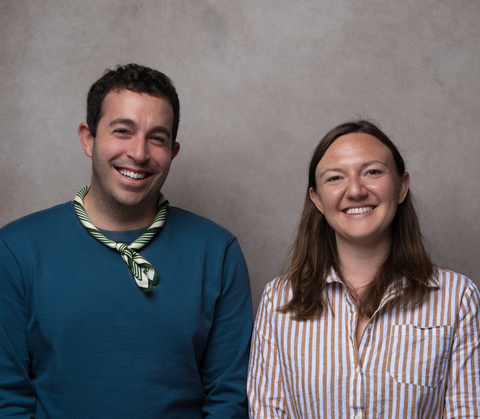Signs on Eight Pharmaceutical Partners and Completes First Preclinical Study from Immune Organoid Platform with Centivax
Parallel Bio, a biotech company pioneering human-first drug discovery, today announced it has raised $21 million Series A funding, led by AIX Ventures. The round attracted prominent leaders in AI and biotech, including new investors Amplo and Marc Benioff, founder and CEO of Salesforce, and existing investors Metaplanet, Humba Ventures, Atypical Ventures, Undeterred Capital, and Jeff Dean.
This press release features multimedia. View the full release here: https://www.businesswire.com/news/home/20250612697548/en/

Parallel Bio co-founders Robert DiFazio (left) and Juliana Hilliard (right)
The company also revealed that 8 pharmaceutical partners, including three Fortune 500 companies, are testing more than 50 drugs and immunotherapies using its organoid-based immune system platform—including Centivax, which completed the first preclinical testing on the platform for its universal flu vaccine candidate.
“With these milestones, we are closer to making human-first drug discovery the new industry standard,” said Robert DiFazio, CEO and co-founder at Parallel Bio. “For too long, the reliance on lab mice to model human biology has come at a high cost: 95% of drugs fail in human trials even after succeeding in animal studies. We’re turning that on its head by using organoids and AI to discover drugs in true-to-life human models from the start.”
Parallel Bio will use the new capital to scale the AI and automation capabilities of its organoid-based immune system platform, expand its team of scientists and engineers, and support growing pharmaceutical partnerships. To date, Parallel Bio has raised a total of nearly $30 million, including this Series A and previous seed rounds.
Parallel Bio’s platform combines lymph-node organoids with AI and robotics to replicate the human immune system at scale across diverse populations. Organoids are 3D, self-assembling models of human biology. These miniature organs mimic an organ’s structure and function and the body’s response to disease or treatment, as if the organoids were individual patients.
AIX Ventures partner Krish Ramadurai, who joined the company’s board of directors as part of the round, commented: “Parallel Bio is redefining drug development by turning the conventional model upside down—transforming today’s 95% failure rate into a pathway for 95% success. Their groundbreaking human-first platform unlocks biological insights previously impossible to capture, accelerating the development of effective treatments that reach patients faster while generating de novo biological data to power the next generation of AI-driven therapeutics. We're thrilled to partner with the Parallel Bio team in setting a new gold standard for the future of medicine.”
Since launching Clinical Trial in a Dish last year, Parallel Bio has seen growing demand from pharmaceutical companies. This first commercial application accurately predicts the safest and most effective drug candidates for human trials.
“Starting with human models enables new drugs to reach the market at a pace never possible before,” said Juliana Hilliard, Parallel Bio co-founder and chief scientific officer. “We aim to slash $2 billion and 9 years from each drug candidate in development by predicting success at the earliest stages of discovery.”
Centivax Validates Broad Immune Response in Organoid Trial
Parallel Bio partnered with Centivax, a universal immunity biotechnology company, to generate human-first data to validate Centivax’s first program: a universal flu vaccine called Centi-Flu that is now in manufacturing for human clinical trials, with the first patient expected to be dosed early next year.
“Parallel Bio enables us to derisk the single biggest source of failure in vaccine development: making sure the vaccines work in humans before the human trials have even begun,” said Jacob Glanville, president and CEO at Centivax. “Even though we have validated our pan-influenza responses in mice, rats, pigs, and ferrets, ultimately we are making a universal vaccine for humans. Parallel Bio’s platform is transformative by allowing us to directly validate our results in immune organoids derived from adult humans.”
The organoid study revealed the power of the Centi-Flu technology: by effectively targeting common features of the virus shared by many different influenza strains, Centi-Flu even produces strong immune responses against strains not included in the vaccine. Human immune organoids were “vaccinated” with Centi-Flu, leading to the production of B cells capable of reacting to a wide variety of flu strains. The immune organoids were derived from patients with prior flu exposure, proving that Centi-Flu could trigger broad humoral responses in flu-exposed individuals.
The organoid model also showed activation of CD4+ and CD8+ T cells, which are important for fighting infections, suggesting that Centi-Flu helps stimulate both antibody production and T cell immunity. This combination is particularly valuable for protecting against severe flu, including hospitalization and death.
About Parallel Bio
Parallel Bio is pioneering human-first drug discovery by combining organoids and AI to create true-to-life models of human biology. The company developed the first platform that replicates the human immune system across diverse populations, predicting drug success and identifying disease targets with accuracy and speed far beyond the limits of traditional animal models. Pharmaceutical partners, including three Fortune 500 companies, are using its Clinical Trial in a Dish to test the safety and efficacy of immunotherapies. Based in Cambridge, Mass., Parallel Bio was founded in 2021 by two scientists behind the world’s first scalable human immune organoid.
View source version on businesswire.com: https://www.businesswire.com/news/home/20250612697548/en/
“Parallel Bio is redefining drug development by turning the conventional model upside down—transforming today’s 95% failure rate into a pathway for 95% success."
Contacts
Media contact
Matt Hicks
press@parallel.bio
Business contact
Robert DiFazio
bd@parallel.bio
